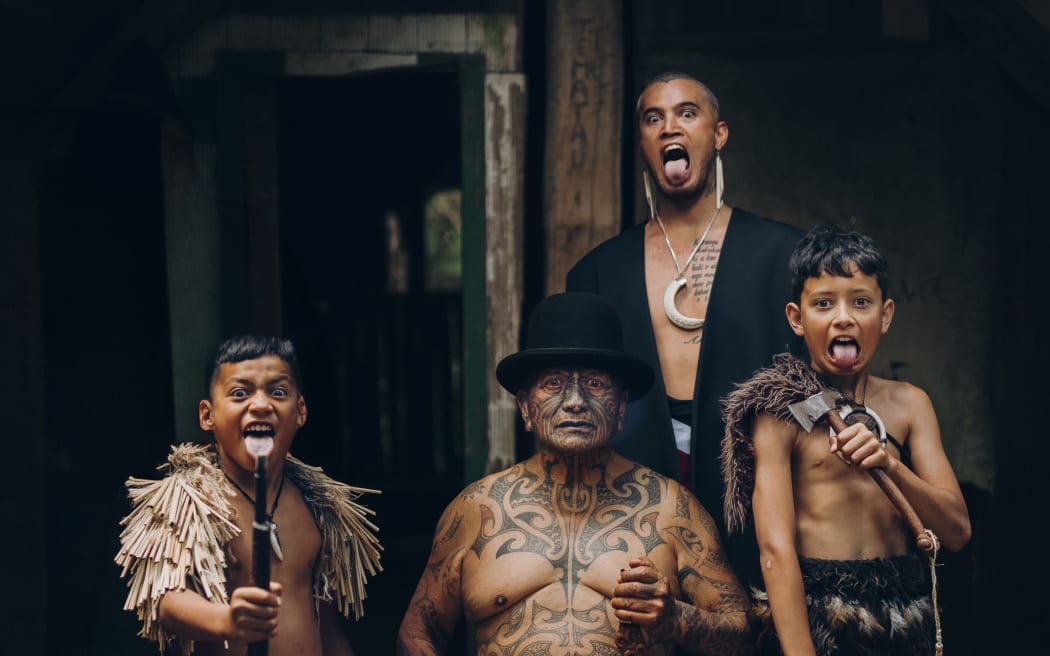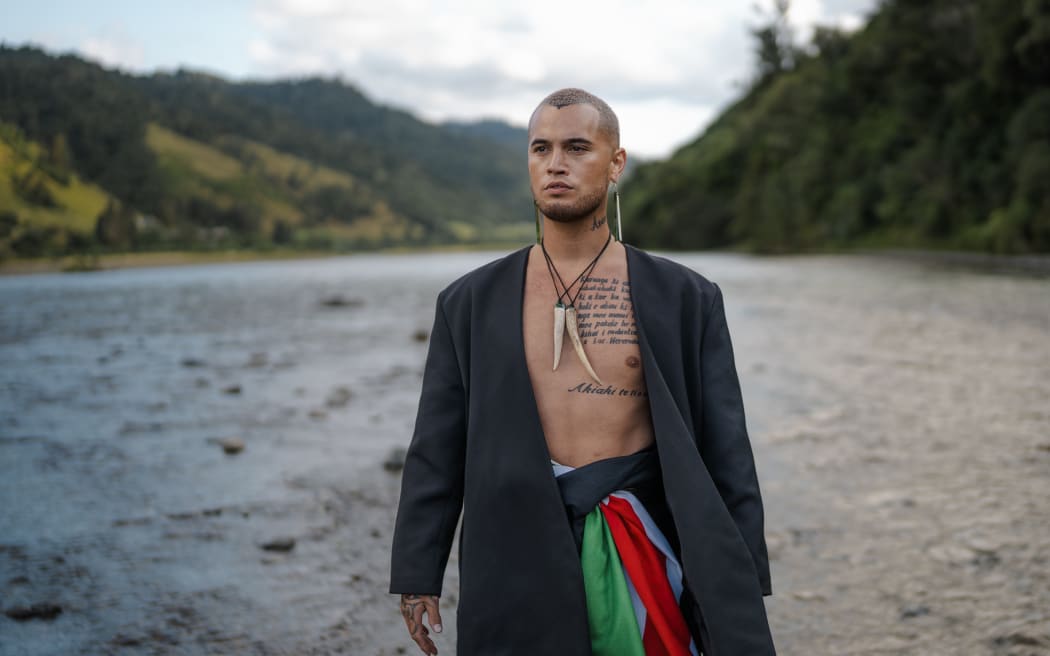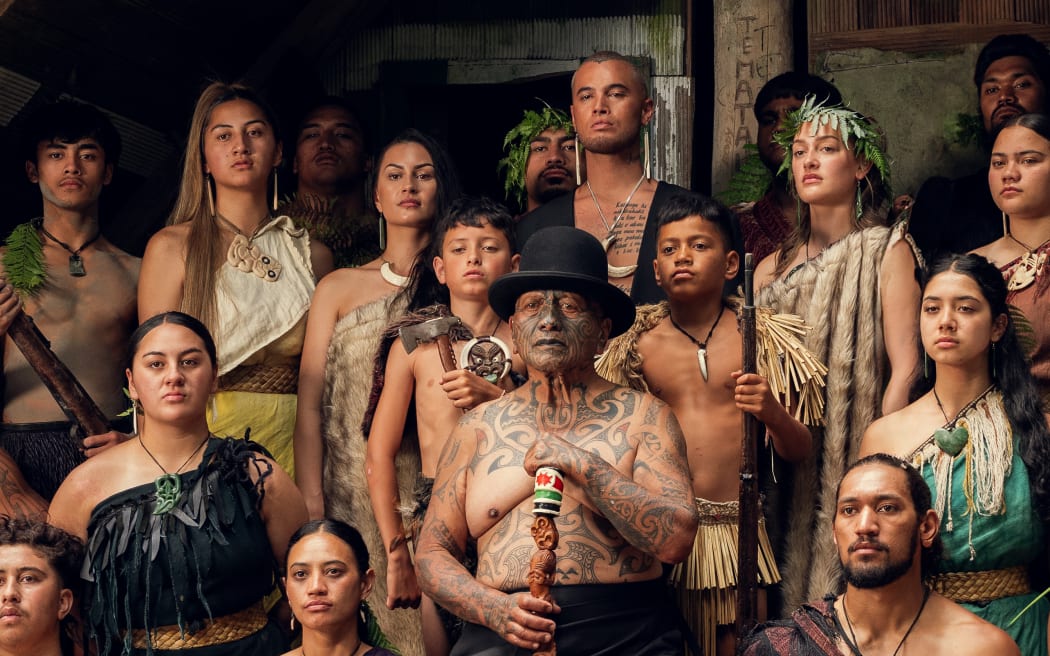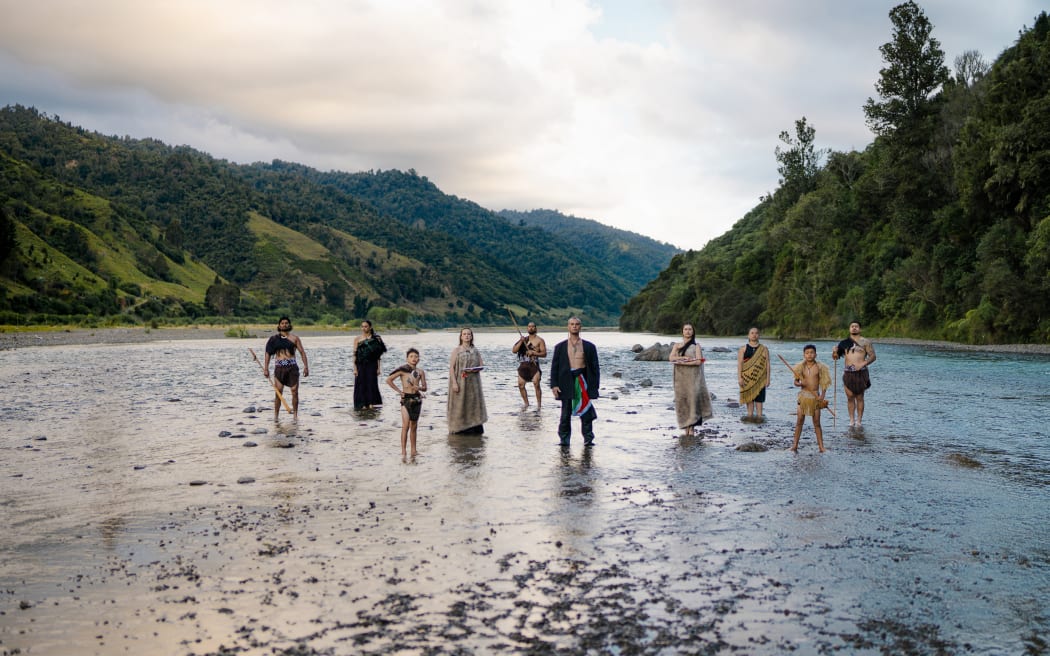
Stan Walker, his uncle Tāme Iti and other whānau in the music video accompanying his new song, 'Māori Ki Te Ao'. Photo: Supplied
Stan Walker is on a mission to “bring hope, healing, love and joy” to people through music – and he’s enlisted a very familiar face to help him do it.
Walker, 33, first sprang to fame by winning the Australian Idol reality TV show in 2009. Since then he’s released seven studio albums and nearly 50 singles, and recovered from life-threatening stomach cancer.
His new single, 'Māori Ki Te Ao', released exclusively today on RNZ, is a call to all Māori to celebrate their roots, Walker tells Music 101’s Charlotte Ryan.
“This is my love letter to our people. This is to say, ‘man, you're incredible. You're amazing. Our reo is amazing. So spread it wide, and far’.”
Walker (Tūhoe, Ngāi TeRangi, Ngāti Ranginui, Ngāti Pūkenga, Tūhourangi Ngāti Wāhiao, Ngāti Porou, Ngāti Whakaue and Ngai Tahu), says the new song was in part inspired by his collaboration with American filmmaker Ava DuVernay on her new film Origin.
The film explores the connections between slavery, the Holocaust and India’s caste system, and Walker says he had some clear ideas of what it was going to be like.
“I went in with the posture of like a ‘oh yeah, I’m a Māori man, I’m already going to feel that I've had these experiences, my parents, my grandparents, so on and so forth. So I came in with that, going in like ‘yep, I'm about to hate some colonisers’.
“By the end of the film, I came out for the first time I think ever in my life that my mind and my heart had changed, that I felt connected to humanity as a whole. And it wasn't like white, black, brown. It was actually these caste systems that have put us in these places of feeling and being hurt. It just blew my mind and I just walked away feeling and asking myself questions like, ‘what do I need to do to be a better human being because I still have these thoughts and feelings?’.
‘I AM’, the 2023 song he wrote for the film, was his emotional reaction to that experience, he says.
“My job as an artist, as a person who people look to as a storyteller, is to bring hope, life, healing and joy to empower people.”

Stan Walker: "I'm made up of so many iwi and hapu." Photo: Supplied
His new song comes from the same wellspring of feeling and is about celebrating identity, Walker says.
“I AM is the reclamation of identity, our roots. 'Māori Ki Te Ao' is standing in my identity. We've had this blanket term, ‘Māori’ over all Māori people, but we actually have our own identities. And I'm made up of so many iwi and hapu.
“We are Māori, but we are more than that, we have our own identity. We have Ngāpuhi, we have Ngāti Porou, we have Ngai Tahu...
“This song is paying homage but [is] also my love letter to my Tūhoe side, to my Tūhoetanga, where I come from, and one of my biggest inspirations has been in Ruatoki.”
Walker wrote the song with his uncle, Donny Te Kanapu Anasta, son of renowned musician Whirimako Black.
“We wrote this song together because we’re passionate about being from Tūhoe, we’re passionate Tūhoe men.”
The pair called on three generations of Tūhoe whanau, including Walker’s uncle Tāme Iti, to help create the song and film the video in Ruatoki.

A scene from 'Māori Ki Te Ao' (Māori to the world). Photo: Supplied
“This is a project that doesn't belong to me,” Walker says.
“It belongs to everybody that was involved. Uncle Tāme, my nephews, my uncle, my cousins, my mates that made this come to life. Having them in the video was incredible. We had three different generations in the video of Tūhoe.
“We shot [the video] at the marae he built with my uncles and aunties with their own hands when they were occupying the land when they tried to take our maunga from us… we were called terrorists but we were occupying our our maunga, which is sacred to us, our whenua so that the government couldn't take it from us and build a road on our maunga.”
Walker now lives in Whanganui. While he’s never lived in Ruatoki, he says all Tūhoe know “the years and years of mamae (shame)” from people seeing them as angry activists.
“It's years and years or of trying to heal and take back what belongs to us. You know we're kaitiaki of this land. We are the land, we feel a connection when land is lost. We feel we’re lost.”

A scene from Stan Walker's new music video, starring members of his whānau. Photo: Supplied
Walker says he was scared of Uncle Tāme when he was young (“he always seemed so huge back then”) but now recognises why he chose activism.
“So him [Iti] and our whanau doing what they did, they stood their ground to have mana motuhake over our whenua, over our tikanga, over our reo. I’m just so inspired by that.
“But now, he knows that he's not that person anymore. And now, the way that he protests and the way that he gets his message out and the way that he stands, is through his art.
“Mana motuhake looks different for everybody. For me and Uncle Tāme, it’s our art. My words fail me so many times, but I have time to correct myself within the songs.”
The song’s release comes at a busy time for Walker, who is expecting his third child with wife Lou Tyson in a few weeks.
“I love being a dad. I love it.
“I've got two opposite kids, like polar opposites. My son's so soft and sweet. And very like, emotional. My daughter, she's a firecracker, got no ears and she's aggressive.
“But I love parenting with my wife. We're very different in terms of how we parent, but we meet in the middle so that we’re consistent.
“It's the most beautiful thing. It's the most fulfilling thing ever. And it just makes my purpose more purposeful.”
While parenthood has made travelling more difficult because he misses his wife and children so much, Walker says being a dad has changed how he views making music.
“I want to leave a legacy for them. So it's important for me, the type of songs, the videos, the imagery, everything that when they look back at their dad, they're like, ‘yeah, that’s my papa.”
Listen to the full interview with Stan Walker here on Music 101.

